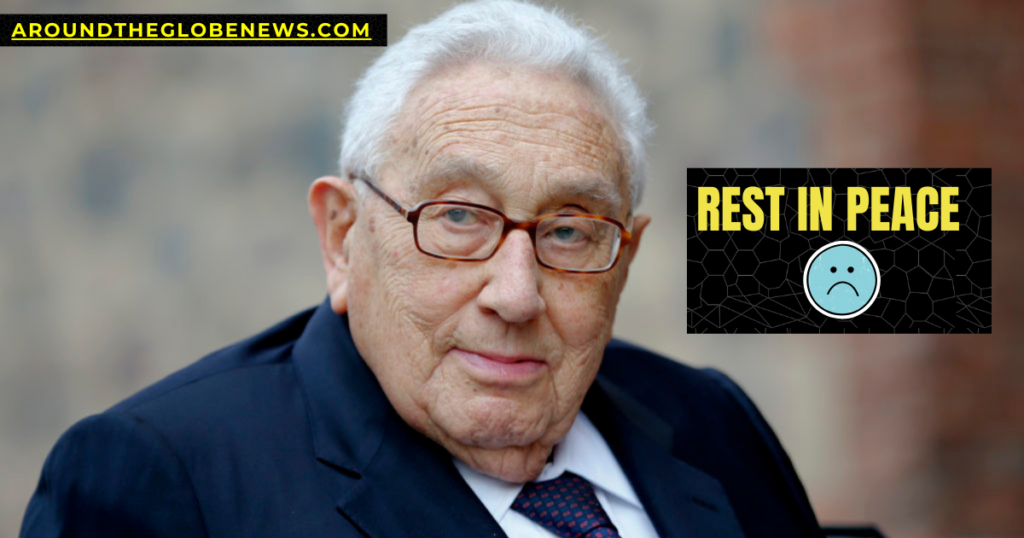Former US Secretary of State Henry Kissinger, who played a pivotal and polarising role in US foreign policy during the Cold War, has died at the age of 100. He served as America’s top diplomat and national security adviser during the Nixon and Ford administrations. Despite leaving office in the mid-1970s, he continued to be consulted by generations of leaders for decades. The German-born former diplomat died at his home in Connecticut.

Henry Kissinger, a name synonymous with diplomatic finesse and geopolitical acumen, stands as one of the most influential figures in modern history. Born on May 27, 1923, in Fürth, Germany, Kissinger’s life has been marked by a relentless pursuit of understanding international relations and shaping global politics. This article Henry Kissinger : Architect of Diplomacy and Global Strategy delves into the multifaceted career of Henry Kissinger, tracing his journey from academia to the pinnacle of diplomatic power.
Early Life and Academic Pursuits
Kissinger’s early life was shaped by the tumultuous events of World War II. Fleeing Nazi persecution, his family immigrated to the United States in 1938. The young Kissinger displayed exceptional intellectual prowess, earning a bachelor’s degree from Harvard University in 1950 and a doctorate in government in 1954. His academic pursuits set the stage for a career that would meld scholarship and statesmanship, a unique combination that distinguished Kissinger in the realm of international affairs.
Rise to Prominence
Kissinger’s ascent to prominence began when he joined the faculty of Harvard University, where he would eventually become a professor of government. His groundbreaking book, “A World Restored: Metternich, Castlereagh and the Problems of Peace, 1812-1822,” showcased his analytical skills and historical understanding. This work not only earned him accolades but also caught the attention of policymakers.
Nixon Administration
In 1969, Henry Kissinger entered the political arena when he was appointed National Security Advisor by President Richard Nixon. This marked the beginning of a transformative era in U.S. foreign policy. Kissinger’s realpolitik approach sought to balance power dynamics, especially during the height of the Cold War.
One of his most significant achievements was orchestrating the opening of diplomatic relations with the People’s Republic of China in 1971, a move that reshaped global geopolitics. The strategic shift not only eased tensions but also contributed to the eventual thawing of the Cold War.
Vietnam War and Nobel Peace Prize
Kissinger’s involvement in the Vietnam War, particularly his role in the secret negotiations that led to the Paris Peace Accords in 1973, was both praised and criticized. While the agreement aimed to bring an end to the conflict, its impact remains a subject of historical debate.
In 1973, Kissinger, alongside Le Duc Tho, was awarded the Nobel Peace Prize for their efforts in negotiating the ceasefire. However, the prize was met with controversy, as Tho declined the honor, citing that peace had not yet been fully established in Vietnam.
Secretary of State
Henry Kissinger’s influence continued to grow, and in 1973, he assumed the role of Secretary of State under President Nixon. His tenure was marked by a focus on détente—the easing of strained relations with the Soviet Union—and the negotiation of arms control agreements. The Strategic Arms Limitation Talks (SALT) and the Helsinki Accords were significant milestones during this period.
Middle East Diplomacy
Kissinger’s diplomatic prowess extended to the Middle East, where he played a crucial role in mediating conflicts. The 1973 Yom Kippur War prompted intensive shuttle diplomacy between Egypt and Israel, culminating in the Camp David Accords in 1978. These historic agreements laid the groundwork for peace between Egypt and Israel and earned Kissinger admiration for his diplomatic finesse.
Legacy and Criticism
Henry Kissinger’s legacy is complex and subject to varied interpretations. Admirers laud his realpolitik approach, emphasizing the pragmatism that guided his decisions during a turbulent period in global affairs. Critics, however, point to the ethical implications of some actions, particularly in relation to covert operations and human rights concerns.
The U.S. bombing campaign in Cambodia during the Vietnam War, as well as alleged support for authoritarian regimes, have been sources of controversy. Kissinger’s policy of supporting anti-communist governments in the pursuit of U.S. interests has drawn condemnation from those who argue that such actions compromised democratic values.
Later Years and Continued Influence
After leaving government service, Kissinger remained a sought-after figure in international relations. His consultancy firm, Kissinger Associates, provided strategic advice to governments and multinational corporations. Despite criticism, his insights continued to shape global debates on diplomacy and statecraft.
Henry Kissinger’s impact on international relations is indelible, his legacy a tapestry woven with both triumphs and controversies. His ability to navigate the complexities of the Cold War, reshape diplomatic landscapes, and broker historic agreements has left an enduring mark on the world stage. As we reflect on his contributions on the ay of his death, the intricate interplay of power, diplomacy, and strategy that defined Kissinger’s career remains a subject of fascination and study, ensuring his place in the annals of diplomatic history. His demise is indeed an immense loss to the planet. That is why probably he is called Henry Kissinger : Architect of Diplomacy and Global Strategy.
Also Read – Charlie Munger’s Net Worth : The Wise Sage of Omaha’s Right-Hand Man
Must Read – Who is Javier Milei